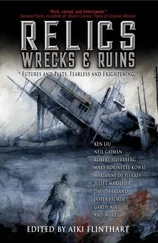Pip Vaughan-Hughes - Relics
Здесь есть возможность читать онлайн «Pip Vaughan-Hughes - Relics» весь текст электронной книги совершенно бесплатно (целиком полную версию без сокращений). В некоторых случаях можно слушать аудио, скачать через торрент в формате fb2 и присутствует краткое содержание. Жанр: Исторический детектив, на английском языке. Описание произведения, (предисловие) а так же отзывы посетителей доступны на портале библиотеки ЛибКат.
- Название:Relics
- Автор:
- Жанр:
- Год:неизвестен
- ISBN:нет данных
- Рейтинг книги:4 / 5. Голосов: 1
-
Избранное:Добавить в избранное
- Отзывы:
-
Ваша оценка:
- 80
- 1
- 2
- 3
- 4
- 5
Relics: краткое содержание, описание и аннотация
Предлагаем к чтению аннотацию, описание, краткое содержание или предисловие (зависит от того, что написал сам автор книги «Relics»). Если вы не нашли необходимую информацию о книге — напишите в комментариях, мы постараемся отыскать её.
Relics — читать онлайн бесплатно полную книгу (весь текст) целиком
Ниже представлен текст книги, разбитый по страницам. Система сохранения места последней прочитанной страницы, позволяет с удобством читать онлайн бесплатно книгу «Relics», без необходимости каждый раз заново искать на чём Вы остановились. Поставьте закладку, и сможете в любой момент перейти на страницу, на которой закончили чтение.
Интервал:
Закладка:
I was just hobbling over to Anna with as much Flemish nobility as I could muster when the priest emerged from the chapel, planted his staff in front of him and began to sing. It was a liturgy of some sort, swooping, quavering, echoing from the walls around us. The man had a voice that seemed to flow up through him from the roots of the mountain. The villagers left their picnics and began to gather around us, crossing themselves in the backwards Greek manner. The song paused, and a murmur of ameen drifted up. The priest was beckoning us. It was time.
I took Anna's hand and we made our way on stiff legs towards the door of the chapel, which gaped like the mouth of a cave behind the priest. Gathering his robes about him, he stepped down and went in. I hesitated for a moment. The doorway was black as the darkest night, and framed by the sun-blasted white of the chapel wall it seemed to me like a hole cut in the day itself. Then a gentle tug of Anna's hand and I was inside.
It took an instant or two for my eyes to accustom themselves to the gloom. All around me was a glimmering, and as my eyes came into focus I realised we were surrounded by hundreds of candles, narrow tapers that each gave out a minute flame of light. There was more space in here than seemed possible from the outside. We stood on a well-worn floor of black and white checkerboard tiles. Around the walls, pews of dark wood flowed with carved vines and snakelike dragons. I looked up. There was a skylight, but the glass was so smoked from centuries of guttering candles that it let in only a dull amber glow. There were faces up there, angels amid a wreath of entwined wings. And ahead, in a halo of candlelight, lay the coffin of Saint Tula. I sucked in my breath with surprise.
Tula lay in a reliquary as rich as any in the great cathedrals of Christendom. It was a rectangular casket clad in hammered silver, into which a skilful hand had inlaid a tracery of leafy branches where birds perched and little animals played. In the centre was a Greek cross in relief, four arms tipped with emeralds radiating from an immense garnet. It was the work of the old Romans, so much finer and lighter than anything of our age. And surely this was the coffin of a Roman noblewoman, not some hedgerow saint. So Adric had been right. The scholars in Cologne had been right. Someone of importance had fetched up here in this out-of-the-way place, and instead of a great cathedral and a cult that brought pilgrims from all corners of the world, she had sunk into obscurity: just another village guardian. And Will had died for her.
As our chaperones, Gilles and the Captain, had followed us into the shrine. I turned and caught Gilles, eyes like saucers, taking everything in. He looked a little like a fox in a henhouse and paced slowly and carefully back and forth across the narrow room. I could read nothing in the Captain's face. Meanwhile the priest was busy with the ornate catches at the head and foot of the casket. He bowed his head and half-sung, half-mumbled a prayer, his palms flat on the lid. Then, with a distinct flourish, he opened it, swinging it back on its hinges until a silver chain held it upright, and beckoned us forward. There was a coverlet of new green silk, which the priest drew to one side. Another loose shroud of linen was parted, and we were looking down on the face of Saint Cordula.
It was still a face, even after nine centuries. The years had turned her skin to the colour and shine of jet. Closed eyelids had fallen in to the sockets, but her eyebrows still arched haughtily. A straight, pinched nose led down to thin lips whose rictus barely hid a flash of shockingly white teeth. Perhaps her hair had been brown. Now it was a dusty bronze, and clung in loose, brittle curls to the black dome of her skull. She wore a tunic of yellowed, stained linen richly worked at collar and cuffs with threads of precious metal, and over it the body was wrapped from neck to ankles in transparent muslin, perhaps to keep the fragile clothing from crumbling. Beneath the cloth the ribcage reared up over the void of the belly. Her hands, rings on three of the black fingers, were crossed below her vanished breasts where a rich pectoral cross nestled. Her feet were encased in new slippers of incongruously bright red leather. The priest removed these with another conjuror's nourish and signalled Anna to approach. He whispered into her ear, and she nodded. Crossing herself slowly, gathered fingers to forehead, heart, right shoulder, left shoulder, she bent and touched the saint's withered lips with her own, then laid her hands on Cordula's chest, then the empty bowl of her stomach, before coming to rest on her groin. Then another motion from the priest, and Anna bent again and kissed Cordula's feet. Then the priest kissed her, one cheek and then the other.
To my intense relief, I was not required to lay lips or even hands on the dead saint. We were ushered out, blinking like moles, into the searing outer world. The people of Limonohori were waiting with flowers, which they threw at our feet as we passed by. So we were drawn, through a lane of grinning, flower-strewing, spitting villagers ('remember – the Evil Eye,' hissed Anna), to the shade of the cypresses, where a trestle table laid with fruit, cakes and a mound of roast fowl awaited us. There were big earthenware pitchers beaded with condensation, which surely held more of that strange island wine. Suddenly I was in powerful need of a drink, and well-water was not going to be enough.
I need not have worried. There was wine in abundance, and although I knew better than to repeat my mistake of the night before, I soon had my thirst satisfied. The balance of things was being restored. Anna taught me how to eat a pomegranate, which I thought an odd kind of food, and an orange. It was sour and refreshing, nothing like anything in my experience. I could find nothing to compare it to: perhaps the juice of a plum with the tang of sorrel – but no. The orange was something else that belonged to this place alone. It would make no sense at home.
Neither the priest nor the village headman spoke anything but Greek and a smattering of Venetian, so we were safe talking in English. I hoped the Greeks would mistake it for Flemish. I did not want to be too obvious, but my impatience was driving me mad.
'So?' I finally asked the Captain, who was to my left, absently spearing grapes with the point of his knife and popping them into his mouth. You know as well as I do.' We've found her.' 'I really think we have.' 'I know we have,' said Anna, reaching out for a grilled quail. 'So sure?' The Captain had an eyebrow cocked in her direction.
'Oh, yes. There's evidence. Did you see the cross on her chest? It had a gold coin set into it, a Roman solidus. Thank your good fortune that I have eyes like an owl. The emperor on the coin was Valentinian the Third. I'm happy to tell you that Valentinian ruled the West from 425 to 455, and Attila sacked Cologne in… 453, wasn't it?'
'I have no idea. Lady Eleni, you are a prodigy,' said the Captain. 'I simply have a basic education,' she grinned. 'So that really is…' I swallowed. 'It is who we hoped it would be, I mean.' 'So it seems,' said Gilles.
'But – and perhaps I'm a little slow, so make allowances, please – I thought Saint Ursula and her virgins were a myth. I mean, that's what most educated people think.' 'And what about Adric's paper trail?' 'Superstitious fabrications, surely.'
'So what are we doing here, then?' asked Gilles through a mouthful of spice cake.
'I thought – I assumed – we were taking advantage of some ancient nonsense and giving our client what he expected, an old body with some sort of shady provenance. Our proof for him would be the fact that we took her from this particular place. But the lady in there really could be you-know-who. And I don't understand how.'
Читать дальшеИнтервал:
Закладка:
Похожие книги на «Relics»
Представляем Вашему вниманию похожие книги на «Relics» списком для выбора. Мы отобрали схожую по названию и смыслу литературу в надежде предоставить читателям больше вариантов отыскать новые, интересные, ещё непрочитанные произведения.
Обсуждение, отзывы о книге «Relics» и просто собственные мнения читателей. Оставьте ваши комментарии, напишите, что Вы думаете о произведении, его смысле или главных героях. Укажите что конкретно понравилось, а что нет, и почему Вы так считаете.












